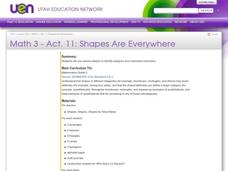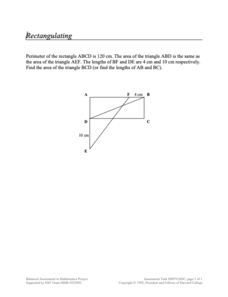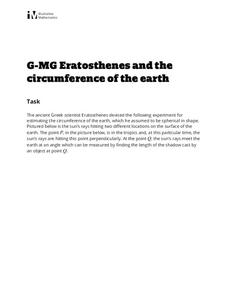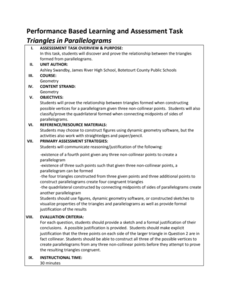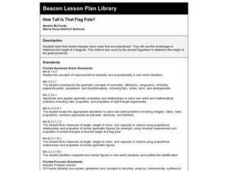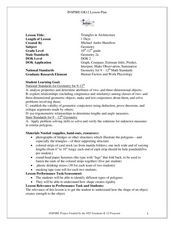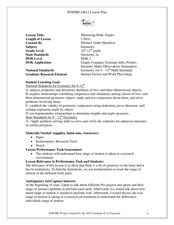Houghton Mifflin Harcourt
Unit 5 Math Vocabulary Cards (Grade 6)
Acute angle, line of symmetry, and vertex are a few terms you'll find in a set of 90 flashcards designed to reinforce math vocabulary. Included in the set are two types of cards; a word card printed in bold font, and a...
Lane Community College
Review Sheets: Geometry
Full of problems with polygons, angles, lines, and triangles, your learners get a multi-page packet that provides all they need to know. It contains many of the standard problem types as well as some more challenging questions.
Curated OER
Figuring in Football
Students identify and visualize congruent and similar two-dimensional geometric figures. They recognize that rotations, translations, and reflections do not change geometric figures. Students participate in activites in which they...
Curated OER
Three- and Two- Dimensional Geometry
In this three- and two- dimensional geometry worksheet, 7th graders solve 12 various problems related to geometric shapes and measurement. They first use paper and a pencil to sketch the front, side, back, top and bottom views of each...
Curated OER
The Triangles Problem
For this geometry worksheet, 10th graders explain how two triangles can have 5 parts of the other triangle and still not be congruent. This is a word problem with an answer key.
Curated OER
Triangle Midsegment
Learn how to calculate the length and midsegments of triangles. Students differentiate between similar and congruent triangles. They create a spreadsheet with their findings.
Curated OER
Alternate Interior Angles
Label angles of parallel lines to analyze the angles created by a transversal and two parallel lines. They graph their lines and observe the similarity and difference in the angles.
Curated OER
Shapes Are Everywhere
Third graders use various shapes to identify polygons and understand symmetry. They explore pattern blocks noticing their similarities and differences, then share with other team members. They draw 3 polygons in their journals and...
Curated OER
Math: Shapes and More Shapes
Students locate lines of symmetry in regular polygons and predict the number of lines of symmetry in an octagon. In three different polygons, they construct all lines of symmetry and after making their prediction about the octagon,...
Illustrative Mathematics
A Midpoint Miracle
Young geometers develop one of the fundamental properties of quadrilaterals (connecting side midpoints gives a parallelogram) in this short but thought-provoking exercise. Using a combination of hands-on techniques and abstract algebraic...
Concord Consortium
Rectangulating
Use rectangles to find distances. Given a rectangle and three associated triangles, pupils determine the area of the triangles. Scholars know the three triangles have equal areas along with the perimeter of the rectangle and two other...
Curriculum Corner
8th Grade Math Common Core Checklist
Ensure your eighth graders get the most out of their math education with this series of Common Core checklists. Rewriting each standard as an "I can" statement, this resource helps teachers keep a record of when each standard was...
Illustrative Mathematics
Eratosthenes and the Circumference of the Earth
The class gets to practice being a mathematician in ancient Greece, performing geometric application problems in the way of Eratosthenes. After following the steps of the great mathematicians, they then compare the (surprisingly...
Radford University
Triangles in Parallelograms
What's the point of looking at triangles when trying to draw parallelograms? Given three non-collinear points, pupils determine and justify all possible points that would create a parallelogram. They then analyze the four triangles that...
CK-12 Foundation
CK-12 Middle School Math Concepts - Grade 6
Twelve chapters cover a multitude of math concepts found in the Common Core standards for sixth grade. Each title provides a brief explanation of what you will find inside the chapter—concepts from which you can click on and learn more...
Curated OER
How Tall Is That Flag Pole?
Pupils examine various triangles and discuss how similar triangles have sides that are proportional. They utilize an ancient Egyptian method to determine the height of a flagpole.
Curated OER
Compass Designs
Learners investigate the properties of two and three dimensional objects. In this geometry lesson, students differentiate polygons based on similarity and congruence. They make observation and interpret the data.
Curated OER
Triangles in Architecture
Students find triangles in the real world. In this geometry lesson, students analyze and identify properties of two and three-dimensional objects. They differentiate between similarity and congruence.
Curated OER
Measuring Body Angles
Young scholars use technology to graph and compare angles. In this geometry lesson, students range of motion in the environment. They identify the missing parts of polygons using similarity and congruence.
Curated OER
Studying Special Segments in Triangles
Young scholars investigate special segments in triangles. In this geometry lesson, students graph, compare, estimate and predict findings based on their data. They differentiate between similarity and congruence of triangles.
Curated OER
Classifying Transformations
Pupils analyze different polygons by shapes and sides. For this geometry lesson, students differentiate between similar and congruent polygons. They name the different polygons based on the number of sides.
Curated OER
Analyzing Body Angles
Students investigate angles of polygons. In this geometry instructional activity, students identify the relationship between angles and the number of sides in a polygon. They differentiate between sumilarity anf congruence in angles and...
Curated OER
Mathematics in Robotics
Learners build and create using math. In this geometry lesson plan, students differentiate between congruent and similarity as they observe polygons. They create robots with different functions using properties of geometry.
Curated OER
Mirror Tool
Students define properties of polygons. In this geometry lesson, students differentiate between similar and congruent polygons. They identify and use the properties of solids to solve problems.







